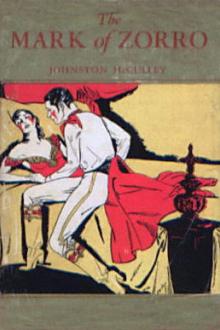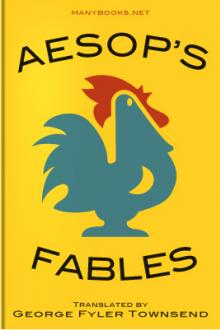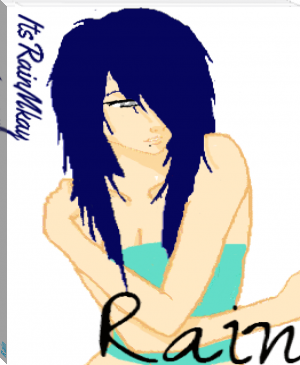The Curse of Capistrano by Harrington Strong (story read aloud TXT) 📕

- Author: Harrington Strong
- Performer: -
Book online «The Curse of Capistrano by Harrington Strong (story read aloud TXT) 📕». Author Harrington Strong
“I have been remarking, caballero,” said the sergeant, “that this fine Senor Zorro never appears in my vicinity, and that I am hoping the good saints will grant me the chance of facing him some fine day, that I may claim the reward offered by the governor. Senor Zorro, eh? Ha!”
“Let us not speak of him,” Don Diego begged, turning from the fireplace and throwing out one hand as if in protest. “Shall it be that I never hear of anything except deeds of bloodshed and violence? Would it be possible in these turbulent times for a man to listen to words of wisdom regarding music or the poets?”
“Meal mush and goat’s milk!” snorted Sergeant Gonzales in huge disgust. “If this Senor Zorro wishes to risk his neck, let him. It is his own neck, by the saints! A cutthroat! A thief! Ha!”
“I have been hearing considerable concerning his work,” Don Diego went on to say. “The fellow, no doubt, is sincere in his purpose. He has robbed none except officials who have stolen from the missions and the poor, and punished none except brutes who mistreat natives. He has slain no man, I understand. Let him have his little day in the public eye, my sergeant.”
“I would rather have the reward!”
“Earn it,” Don Diego said. “Capture the man!”
“Ha! Dead or alive, the governor’s proclamation says. I myself have read it.”
“Then stand you up to him and run him through, if such a thing pleases you,” Don Diego retorted. “And tell me all about it afterward—but spare me now.”
“It will be a pretty story!” Gonzales cried. “And you shall have it entire, caballero, word by word! How I played with him, how I laughed at him as we fought, how I pressed him back after a time and ran him through—”
“Afterward—but not now!” Don Diego cried, exasperated. “Landlord, more wine! The only manner in which to stop this raucous boaster is to make his wide throat so slick with wine that the words cannot climb out of it!”
The landlord quickly filled the mugs. Don Diego sipped at his wine slowly, as a gentleman should, while Sergeant Gonzales took his in two great gulps. And then the scion of the house of Vega stepped across to the bench and reached for his sombrero and his serape.
“What?” the sergeant cried. “You are going to leave us at such an early hour, caballero? You are going to face the fury of that beating storm?”
“At least I am brave enough for that,” Don Diego replied, smiling. “I but ran over from my house for a pot of honey. The fools feared the rain too much to fetch me some this day from the hacienda. Get me one, landlord.”
“I shall escort you safely home through the rain!” Sergeant Gonzales cried, for he knew full well that Don Diego had excellent wine of age there.
“You shall remain here before the roaring fire,” Don Diego told him firmly. “I do not need an escort of soldiers from the presidio to cross the plaza. I am going over accounts with my secretary, and possibly may return to the tavern after we have finished. I wanted the pot of honey that we might eat as we worked.”
“Ha! And why did you not send that secretary of yours for the honey, caballero? Why be wealthy and have servants, if a man cannot send them on errands on such a stormy night?”
“He is an old man and feeble,” Don Diego explained. “He also is secretary to my aged father. The storm would kill him. Landlord, serve all here with wine and put it to my account. I may return when my books have been straightened.”
Don Diego Vega picked up the pot of honey, wrapped his scrape around his head, opened the door, and plunged into the storm and darkness.
“There goes a man!” Gonzales cried, flourishing his arms. “He is my friend, that caballero, and I would have all men know it! He seldom wears a blade, and I doubt whether he can use one—but he is my friend! The flashing dark eyes of lovely senoritas do not disturb him, yet I swear he is a pattern of a man!
“Music and the poets, eh? Ha! Has he not the right, if such is his pleasure? Is he not Don Diego Vega? Has he not blue blood and broad acres and great storehouses filled with goods? Is he not liberal? He may stand on his head or wear petticoats, if “it please him—yet I swear he is a pattern of a man!”
The soldiers echoed his sentiments since they were drinking Don Diego’s wine and did not have the courage to combat the sergeant’s statements anyway. The fat landlord served them with another round since Don Diego would pay. For it was beneath a Vega to look at his score in a public tavern, and the fat landlord many times had taken advantage of this fact.
“He cannot endure the thought of violence or bloodshed,” Sergeant Gonzales continued. “He is as gentle as a breeze of spring. Yet he has a firm wrist and a deep eye. It merely is the caballero’s manner of seeing life. Did I but have his youth and good looks and riches— Ha! There would be a stream of broken hearts from San Diego de Alcala to San Francisco de Asis!”
“And broken heads!” the corporal offered.
“Ha! And broken heads, comrade! I would rule the country! No youngster should stand long in my way. Out with blade and at them! Cross Pedro Gonzales, eh? Ha! Through the shoulder—neatly! Ha! Through a lung!”
Gonzales was upon his feet now, and his blade had leaped from its scabbard. He swept it back and forth through the air, thrust, parried, lunged, advanced, and retreated, shouted his oaths, and roared his laughter as he fought with shadows.
“That is the manner of it!” he screeched at the fireplace. “What have we here? Two of you against one? So much the better, senores! We love brave odds! Ha! Have at you, dog! Die, hound! One side, poltroon!”
He reeled against the wall, gasping, his breath almost gone, the. point of his blade resting on the floor, his great face purple with the exertion and the wine he had consumed, while the corporal and the soldiers and the fat landlord laughed long and loudly at this bloodless battle from which Sergeant Pedro Gonzales had emerged the unquestioned victor.
“Were—were this fine Senor Zorro only before me here and now!” the sergeant gasped.
And again the door was opened suddenly, and a man entered the inn on a gust of the storm.
THE NATIVE HURRIED forward to fasten the door against the force of the wind, and then retreated to his corner again. The newcomer had his back toward those in the long room. They could see that his sombrero was pulled far down on his head, as if to prevent die wind from whisking it away, and that his body was enveloped in a long cloak that was wringing wet.
With his back still toward them, he opened the cloak and shook the raindrops from it and then folded it across his breast again as the fat landlord hurried forward, rubbing his hands together in expectation, for he deemed that here was some caballero off the highway who would pay good coin for food and bed and care for his horse.
When the landlord was within a few feet of him and the door the stranger whirled around. The landlord gave a little cry of fear and retreated with speed. The corporal gurgled deep down in his throat; the soldiers gasped; Sergeant Pedro Gonzales allowed his lower jaw to drop and let his eyes bulge.
For the man who stood straight before them had a black mask over his face that effectually concealed his features, and through the two slits in it his eyes glittered ominously.
“Ha! What have we here?” Gonzales gasped finally, some presence of mind returning to him.
The man before them bowed.
“Senor Zorro, at your service,” he said.
“By the saints I Senor Zorro, eh?” Gonzales cried.
“Do you doubt it, senor?”
“If you are indeed Senor Zorro, then have you lost your wits!” the sergeant declared.
“What is the meaning of that speech?”
“You are here, are you not? You have entered the inn, have you not? By all the saints, you have walked into a trap, my pretty highwayman!”
“Will the senor please explain?” Senor Zorro asked. His voice was deep and held a peculiar ring.
“Are you blind? Are you without sense?” Gonzales demanded. “Am I not here?”
“And what has that to do with it?”
“Am I not a soldier?”
“At least you wear a soldier’s garb, senor.”
“By the saints, and cannot you see the good corporal and three of our comrades? Have you come to surrender your wicked sword, senor? Are you finished playing at rogue?”
Senor Zorro laughed, not unpleasantly, but he did not take his eyes-from Gonzales.
“Most certainly I have not come to surrender,” he said. “I am on business, senor.”
“Business?” Gonzales queried.
“Four days ago, Senor, you brutally beat a native who had won your dislike. The affair happened on the road between here and the mission at San Gabriel.”
“He was a surly dog and got in my way! And how does it concern you, my pretty highwayman?”
“I am the friend of the oppressed, Senor, and I have come to punish you.”
“Come to—to punish me, fool? You punish me? I shall die . of laughter before I can run you through! You are as good as dead, Senor Zorro! His excellency has offered a pretty price for your carcass! If you are a religious man, say your prayers! I would not have it said that I slew a man without giving him time to repent his crimes. I give you the space of a hundred heartbeats.”
“You are generous, Senor, but there is no need for me to say my prayers.”
“Then must I do my duty,” said Gonzales, and lifted the point of his blade. “Corporal, you will remain by the table, and the men also. This fellow and the reward he means are mine!”
He blew out the ends of his mustache and advanced carefully, not making the mistake of underestimating his antagonist, for there had been certain tales of the man’s skill with a blade. And when he was within the proper distance he recoiled suddenly, as if a snake had warned of a strike.
For Senor Zorro had allowed one hand to come from beneath his cloak, and the hand held a pistol, most damnable of weapons to Sergeant Gonzales.
“Back, Senor!” Senor Zorro warned.
“Ha! So that is the way of it!” Gonzales cried. “You carry that devil’s weapon and threaten men with it! Such things are for use only at a long distance and against inferior foes. Gentlemen prefer the trusty blade.”
“Back, Senor! There is death in this you call the devil’s weapon. I shall not warn again.”
“Somebody told me you were a brave man,” Gonzales taunted, retreating a few feet. “It has been whispered that you would meet any man foot to foot and cross blades with him. I have believed it of you. And now I find you resorting to a weapon fit for nothing except to use against red natives. Can it be, senor, that you lack the courage I have heard you possess?”
Senor Zorro laughed again.
“As to that you shall see presently,” he





Comments (0)